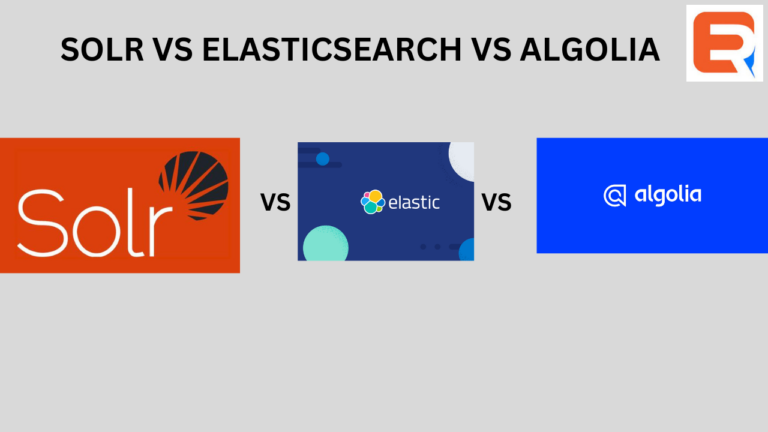When it comes to search solutions, Solr, Elasticsearch, and Algolia are three popular choices, each with its own strengths and capabilities. In this article, we will compare these search platforms across various factors to help you make an informed decision based on your specific requirements.
Search Capabilities
-
Solr
Solr is a powerful open-source search platform based on Apache Lucene. It offers robust full-text search capabilities, faceted search, filtering, sorting, and highlighting. Solr supports advanced query parsing, allowing complex search queries and custom ranking strategies.
-
Elasticsearch
Also built on Apache Lucene, Elasticsearch is a distributed search and analytics engine known for its near-real-time search capabilities. It provides flexible full-text search, including features like fuzzy search, phrase matching, and relevance scoring. Elasticsearch’s distributed nature enables horizontal scalability and high availability.
-
Algolia
Algolia is a hosted search and discovery platform designed for developers. It offers lightning-fast search with typo tolerance, synonyms, faceting, and advanced relevance settings out of the box. Algolia’s intuitive dashboard and APIs make it easy to implement and customize search experiences.
Scalability and Performance
-
Solr
Solr provides excellent scalability and performance, allowing you to distribute indexes across multiple nodes to handle large data volumes. It supports sharding and replication for high availability and fault tolerance. Solr’s performance can be further enhanced with optimizations like caching and query result caching.
-
Elasticsearch
Elasticsearch is renowned for its scalability and distributed architecture. It can seamlessly scale horizontally by adding more nodes, ensuring high throughput and low latency search operations. Elasticsearch’s distributed nature also contributes to fault tolerance and data redundancy.
-
Algolia
Algolia is a managed solution that takes care of scalability on your behalf. It automatically handles indexing, replication, and load balancing. Algolia’s distributed infrastructure ensures high availability and fast response times, making it an excellent choice for rapid scaling without the need for manual configuration.
Ease of Use and Administration
-
Solr
Solr offers a rich set of features, but it may require more configuration and setup compared to other solutions. It provides a web-based administration interface for managing indexes, schema, and monitoring. Solr’s flexibility allows customization, but it may require more development and maintenance effort.
-
Elasticsearch
Elasticsearch is known for its ease of use and developer-friendly approach. It provides a RESTful API for interacting with the system, making it easy to index and search data. Elasticsearch’s management tools, like Kibana, offer visualizations, monitoring, and debugging capabilities.
-
Algolia
Algolia shines in terms of simplicity and ease of use. It offers an intuitive dashboard where you can configure settings, manage indexes, and monitor performance. Algolia’s API and client libraries are well-documented and provide straightforward integration options.
Features and Ecosystem
-
Solr
Solr offers a wide range of features, including advanced search capabilities, faceting, distributed indexing, content replication, and data import functionality. It has a mature ecosystem with extensive community support and a rich set of plugins and extensions.
-
Elasticsearch
Elasticsearch provides a comprehensive set of features beyond search, such as aggregations, analytics, and machine learning capabilities. It integrates seamlessly with the Elastic Stack, including tools like Logstash for data ingestion and Kibana for data visualization.
-
Algolia
Algolia focuses on search and discovery, offering features like typo tolerance, synonym handling, geo-search, and personalized recommendations. It provides an integrated approach, with search, relevance, and analytics features built into the platform.
Pricing and Hosting
-
Solr
Solr is an open-source solution, which means it is free to use. However, you will need to invest in infrastructure, hosting, and maintenance costs. Cloud-based hosting services like Apache Solr Cloud or third-party providers offer managed Solr hosting options for easier deployment and scaling.
-
Elasticsearch
Elasticsearch is open source, but the commercial version, Elasticsearch Service, offered by Elastic, provides additional features and support. It also offers Elastic Cloud, a fully managed Elasticsearch hosting service, with pricing based on the resources consumed.
-
Algolia
Algolia is a cloud-based, fully managed solution. It offers different pricing plans based on usage, including options for startups, businesses, and enterprise-level customers. Algolia’s pricing includes hosting, maintenance, and support, simplifying the operational aspects.
Conclusion
Choosing the right search solution depends on your specific needs and priorities. Solr is a powerful open-source search platform with extensive customization options. Elasticsearch excels in scalability and ease of use, with a rich ecosystem of features and integrations. Algolia offers a managed search and discovery platform focused on simplicity and speed. Consider factors such as search capabilities, scalability, ease of use, features, and pricing to make an informed decision that aligns with your business requirements.




